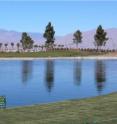Keeping golf courses green when fresh water is limited
Explosive population growth in southern Nevada has placed increasing demands on available water resources. In 2007, 80% of the state's residents lived in southern Nevada, where the population approached two million people. The dual concerns of this population boom and a climate that features frequent severe drought conditions has created an urgent demand for officials to investigate alternative water resources to meet resident and visitor demand. Las Vegas operates on a "Return Flow Credit" program for reuse water returned to Lake Mead after being treated. The cities of Henderson and Las Vegas, along with the Clark County Sanitation District, release a portion of the treated wastewater to be utilized for irrigation. The remainder of the treated wastewater is returned to the Colorado River system through the Las Vegas Wash. Utilizing "treated sewage effluent", or "reuse water", for landscape irrigation is an environmentally acceptable alternative to the current system of discharging waste water into rivers and lakes.
The use of reuse water in the Las Vegas Valley is expanding through the use of satellite treatment plants into areas in the north and southwest parts of the valley, reducing the need to expand both the water delivery and sewage discharge systems. Clearly, as the practice of using lower-quality water for irrigation expands, there is an increased emphasis on the use of valid, science-based management practices.
Successful development of a program for reuse water use in southern Nevada has evolved in close collaboration with the area's golf course industry. Southern Nevada is home to 53 golf courses, many of them high-end, premiere courses. The area is one of the United States' fastest growing golf destinations, with revenue from the golf industry representing a significant part of Las Vegas' tourism-driven economy.
Naturally, the use of reuse water has limitations due to the quality of the water. Golf course superintendents have expressed concerns over the use of reuse water because of hidden costs associated with the practice. These hidden costs include: foliar damage to ornamental plants, decline in water quality and aesthetic value of irrigation ponds and water features, related damage to equipment, long-term salt buildup in soil, and increased levels of turfgrass stress.
To address these and other concerns, Anne M. Lockett and Dale Devitt of the University of Nevada Las Vegas, and Robert L. Morris of the University of Nevada Cooperative Extension Service, designed and carried out a long-term monitoring study that was subsequently published in a 2008 issue of the American Society for Horticultural Science's journal HortScience.
The researchers conducted a monitoring program on nine golf courses in the Las Vegas valley for 4.5 years to assess the impact of reuse water on soil–turfgrass systems, including bermudagrass, perennial ryegrass, and bentgrass. The nine courses selected included three long-term reuse courses, three fresh water courses, and three courses expected to transition to reuse water during the monitoring period.
The researchers reported on the salt buildup in soil samples and plant response associated with the irrigation of golf courses with different sources of water. Monthly questionnaires were sent to all participating golf course superintendents requesting information on irrigation amounts and times, fertilizer uses, and fairway/green mowing heights. In the spring of each year, 25 soil samples taken from fairways and greens were analyzed for "gravimetric water content" and "saturation extract soil salinity".
The scientists concluded that proper irrigation management, based on a multi-tiered feedback system (soil–plant–atmospheric monitoring), should be able to maintain favorable salt balances and plant response as long as irrigation volumes are not restricted. "Based on the results of this study, we believe reuse water should be embraced by the golf course industry", stated Devitt.


